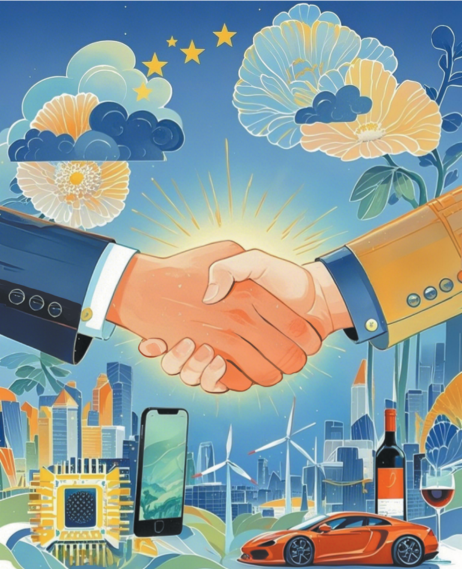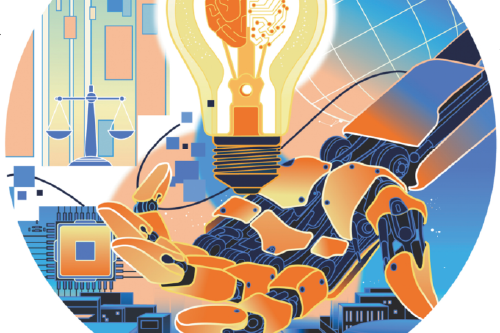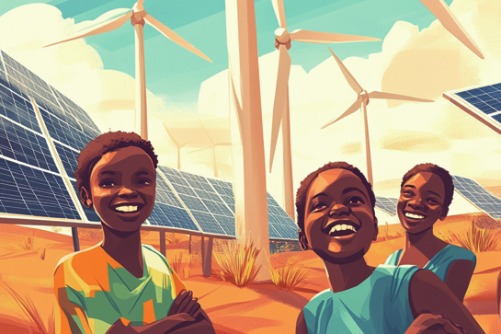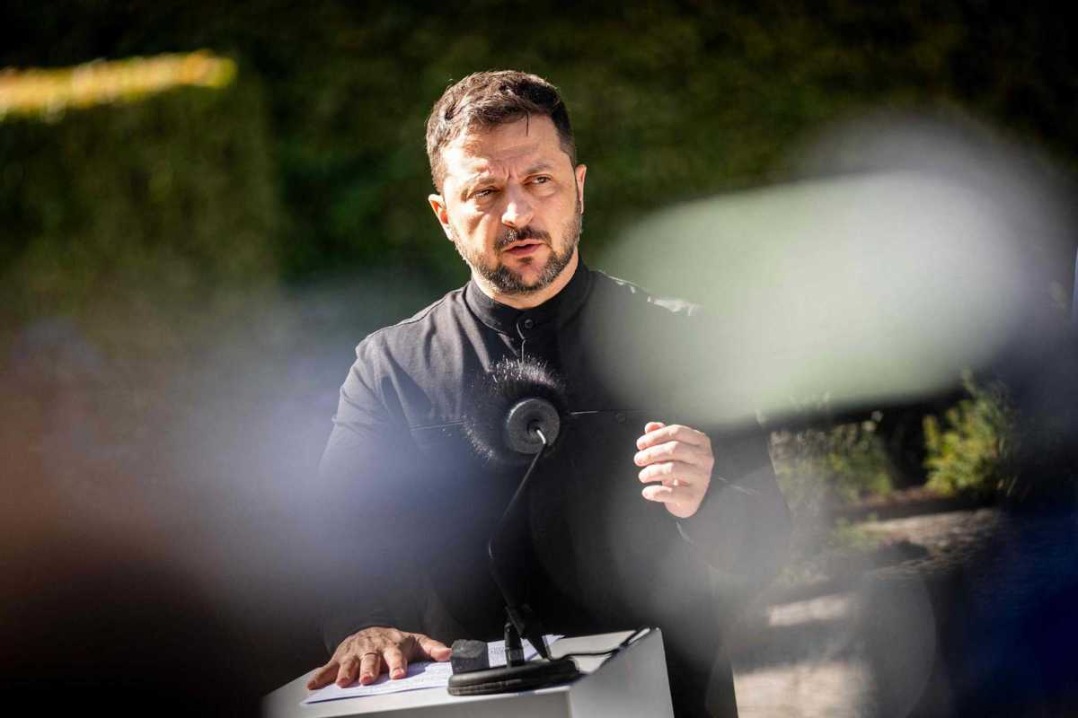Time to break free of dependency


The EU needs to develop an independent foreign policy that is not under the sway of Washington or it will become an increasingly spent force
The United States is the largest third-party factor in China-Europe relations, exerting its influence over the relationship by intervening in the European Union's China policy. Now that Donald Trump has begun his second term as president, Washington's significant policy shifts are poised to deeply impact the trajectory of China-EU relations.
The US has long viewed China as its primary strategic competitor. In addition to its across-the-board efforts to contain and suppress China, Washington is pressuring the EU to join it in obstructing pragmatic China-EU cooperation. This includes pressuring the EU to make efforts to curb China's high-value manufacturing industries and to reduce its economic ties with China. The EU has its own considerations and interests in its China policy, which do not always align with those of the US. However, the bloc has repeatedly yielded to US pressure, making decisions that harm its own interests. For example, Brussels has limited the use of Huawei's 5G products, banned the export of high-tech items such as ASML's chip manufacturing equipment to China, introduced overly politicized and security-driven "de-risking "policies, and aligned with the US' "Indo-Pacific" strategy, with the bloc deploying warships to the South China Sea and the Taiwan Strait under the guise of "freedom of navigation", and increasing its exchanges with the island of Taiwan.
While some of these policies have been driven by internal factors within the EU, the pressure from the US has been the primary driving force. These moves, which align with US interests, have damaged the EU's own interests and brought about new risks to its economic and social development. Such practices have cut exports and jobs, stunted economic growth, and increased the EU's likelihood of being "caught up in crises that are not ours".
Over the past four years, the previous Joe Biden administration sought to draw the EU closer to the US, and the bloc increasingly accommodated the Biden administration. Brussels hoped that Washington would pay more attention to its security interests; that it could leverage the US to overcome the EU's economic difficulties; and that the US would continue to exercise global leadership to safeguard Western interests.
However, with the start of Trump's second term, Europe's hopes have been dashed, and it could even find itself in a position where even if it desires to be a US "vassal" but fails to be one. During his first term, Trump regarded the EU as a "foe", and since the start of his second term, Washington's policies have clearly sidelined, ignored and harmed Europe. For instance, on the issue that Europe values most — the Ukraine crisis — Trump bypassed both Europe and Ukraine to hold direct talks with Russia, adopting a policy that, from Europe's perspective, seemed to favor Russia and undermine Ukrainian and European security. Furthermore, senior US officials have directly interfered in European domestic affairs by supporting the far-right parties against Europe's mainstream political parties, claiming that Europe's biggest threat is the internal erosion of democracy. Trump also declared that he would not rule out using force to acquire Greenland, a semi-autonomous territory of Denmark which is both a member of the EU and NATO. He has also threatened to impose tariffs on EU products, calling the EU's trade practices an "atrocity". The Trump administration also announced the US' withdrawal from the Paris Agreement and the World Health Organization, as well as sanctions on the International Criminal Court, among other actions. All these moves, from Europe's point of view, have undermined its interests and values.
Thus, despite Europe's preparation for Trump's potential re-election, the series of policies since the start of his second term have nonetheless been a significant shock to Europe. How Europe will respond, and the bloc's future course, have become unavoidable and pressing questions.
One possibility is that Europe will further accommodate the US, increasingly surrendering to US demands — losing more of its autonomy and independence, ultimately becoming a US "vassal" as French President Emmanuel Macron fears. This cannot be ruled out entirely, given that, compared to 2016 when Trump was first elected, the EU is now in a much weaker position, lacking internal unity and leadership. The gap between the EU and the US in economic, financial, technological and military power has grown wider, and Europe's dependence on the US has deepened. Europe, to a larger extent than before, finds itself swept into the US' global strategy, making it more difficult to say "no "to the US than ever before. At present, Europe is still observing, holding out hope for the second Trump administration, and emphasizing the benefits of the transatlantic alliance and NATO for the US.Some countries and politicians are attempting to play the China card, sacrificing China-EU relations to cater to US interests.
However, there is also another possibility — that Europe will fully recognize the unreliability and selfishness of the US, fully acknowledging the necessity and urgency of achieving strategic autonomy. Faced with pressure, Europe could unite further and seek to push for strategic autonomy. An undeniable fact is that for Europe, the US will become even more unreliable in the future. Increasingly, Europeans are coming to see the US not as an ally but as a potential adversary. Under these circumstances, Europe's perception of China and its policies could take on a different perspective.
For a long time, China's policy toward Europe has been consistent, stable and predictable — supporting European integration, backing Europe's strategic autonomy, and maintaining a comprehensive strategic partnership with the EU. Over the past few years, however, China-EU relations have seen some negative shifts. These changes are not due to any shift in China's policy, but rather because of shifts in the EU's approach to China. In 2019, the EU adopted its three-sided definition of China — a partner for cooperation, an economic competitor and a systemic rival. However, this positioning has been full of contradictions and is increasingly leaning toward the latter two, damaging both China-EU relations and Europe's own interests. The shift in Europe's position on China can be attributed to changes within Europe's economy, society, and politics, but undoubtedly, the US has played a significant role in this shift.
Today, the US is becoming a comprehensive challenge, rival, and even a threat to Europe in economic, political and diplomatic domains. The transatlantic alliance is unraveling, and it is unlikely to be restored in the future. In order to better safeguard its own development and security interests, Europe needs to develop an independent foreign policy, including its policy toward China, free from US interference.
In the current climate, China's domestic and foreign policies are increasingly stable and predictable, underscoring their significance for both Europe and the world. The common interests between China and Europe are becoming more prominent. Both China and the EU need a stable and predictable global economic and trade order, and both sides should promote each other's economic and social development through open trade policies, as opposed to protectionism. Together, they can also set an example for global trade, bringing certainty to the global economy. Both sides need to support global multipolarity and multilateralism, uphold the international system and order centered around the United Nations, and oppose unilateral hegemonic policies. Additionally, both China and the EU must intensify efforts to combat climate change. In conclusion, cooperation should be the dominant theme of China-EU relations, and more cooperation in more fields and at deeper levels is needed. This serves the interests of both sides and contributes to global stability and development. Trump's second term presents challenges for China, Europe and the world, but it also brings more opportunities for cooperation — opportunities that the EU should seize in its pursuit of strategic autonomy and European sovereignty.
The author is vice-president of the China Institutes of Contemporary International Relations. The author contributed this article to China Watch, a think tank powered by China Daily.
The views do not necessarily reflect those of China Daily.
Contact the editor at editor@chinawatch.cn.


































